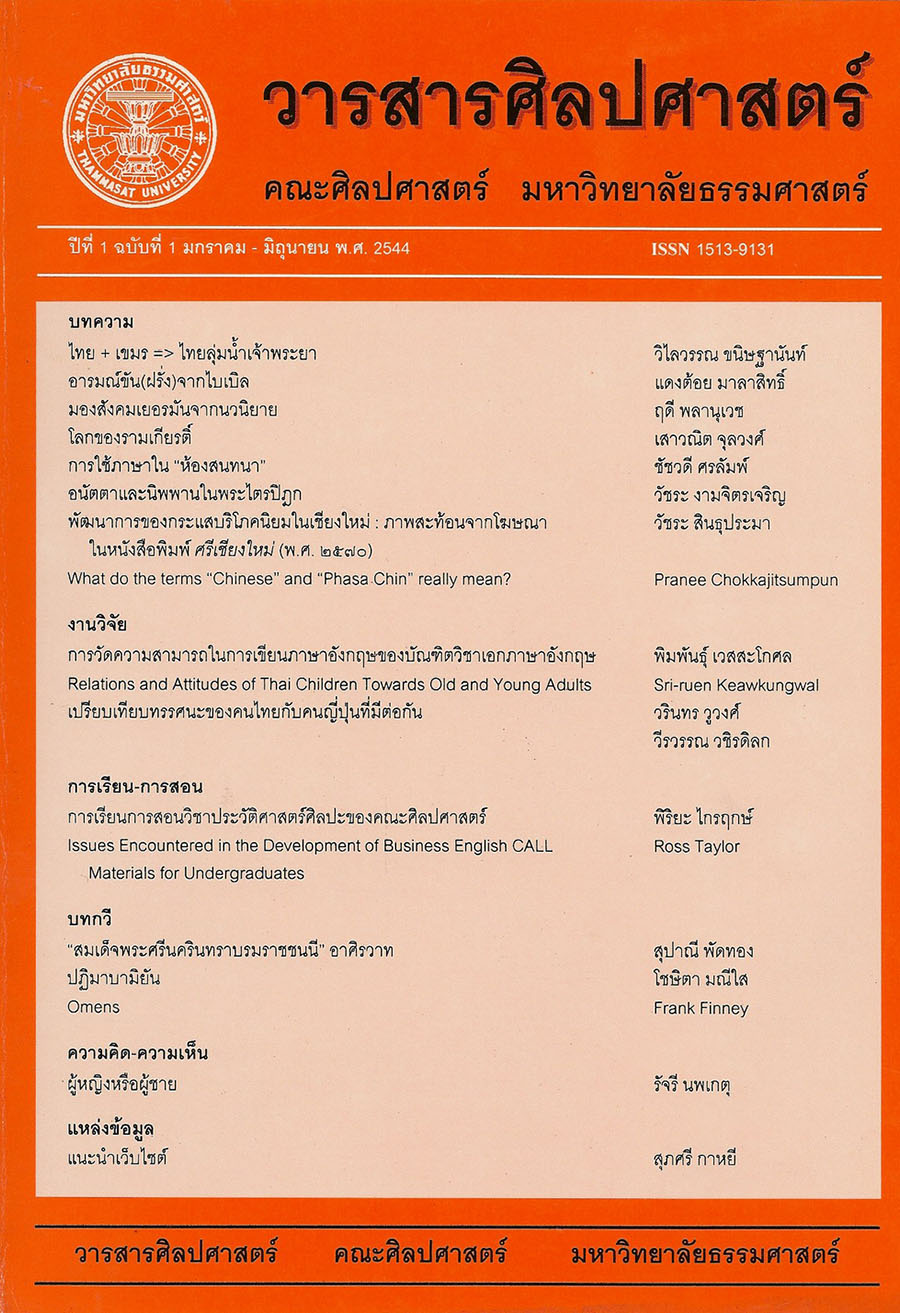Relationships and Attitudes of Thai Children Towards Old and Yong Adults
Main Article Content
บทคัดย่อ
ความสัมพันธ์ระหว่างวัยที่มีลักษณะทางบวกมีความสำคัญต่อความพอใจในชีวิต การปรับตัวที่ดี และการมีบุคลิกภาพที่มั่นคงของทั้งเด็กและผู้ใหญ่ ส่วนความสัมพันธ์ระหว่างวัยทางลบมีผลกระทบทางลบต่อความสัมพันธ์ดังกล่าว กรณีนี้มีความมุ่งหมายสองประการคือ ประการแรก เพื่อศึกษารูปแบบของความสัมพันธ์ระหว่างเด็กและผู้ใหญ่ รวมทั้งทัศนคติของเด็กต่อผู้ใหญ่ของเด็ก 5 พื้นที่ คือ เหนือ ใต้ ตะวันออกเฉียงเหนือ กลางและกรุงเทพฯ ประการที่สอง เพื่อศึกษาความแตกต่างของอิทธิพลทางสังคม วัฒนธรรม เศรษฐกิจ และขนบทางศาสนา ของ 5 พื้นที่นั้น ที่มีผลต่อรูปแบบความสัมพันธ์ระหว่างเด็กและผู้ใหญ่ กลุ่มตัวอย่างที่ศึกษาในครั้งนี้ คือ เด็กจำนวน 660 คน (7-12 ปี) ซึ่งเป็นตัวแทนของประชากรจาก 5 พื้นที่นั้น แบบสอบถามที่ใช้ในการวัดรูปแบบความสัมพันธ์และทัศนคตดคือ Sematic Differential Subtest ข้อตกลงเบื้องต้นในการศึกษานี้ได้แก่ ลักษณะทัศนคติเป็นสิ่งบ่งชี้ลักษณะสัมพันธภาพ จากการศึกษาพบว่า ลักษณะสัมพันธภาพระหว่างเด็กผู้ใหญ่มีหลายรูปแบบ ทัศนคดิของเด็กที่มีต่อผู้ใหญ่มีหลายแบบเช่นกัน ความหลากหลายดังกล่าวเกิดจากประเด็นหลักคือ ความแตกต่างของลักษณะเศรษฐกิจสังคม ค่านิยมเชิงวัฒนธรรมและขนบทางศาสนาของทั้ง 5 พื้นที่นั้น ผลการศึกษานี้ทำให้ทราบถึงปัจจัยเกื้อหนุนชีวิตที่ดีของเด็กและผู้ใหญ่ รวมทั้งวิถีชีวิตของคนไทยโดยรวมและโดยแยกตามพื้นที่ทั้ง 5 แห่ง อาทิเช่น เด็กไทยมีทัศนคติทางบวกต่อผู้ใหญ่ในหลายๆ ด้าน โดยขึ้นอยู่กับลักษณะความสัมพันธ์ในครอบครัว ลักษณะทางสังคมเศรษฐกิจและรูปแบบของวัฒนธรรมท้องถิ่น เด็กส่วนใหญ่ยังคงมีกิจกรรมกับญาติผู็สูงอายุและผู้สูงอายุที่ไม่ใช่ญาติ เด็กส่วนมากไม่ค่อยไปวัด ผู้สูงอายุในชนบทมีเวลาให้เด็กมากกว่าผู้สูงอายุในเมือง เด็กชนบทมีความผูกพันกับผู้สูงอายุมากกว่าเด็กเมือง ทัศนคติของเด็กภาคใต้ต่อผู้ใหญ่ซึ่งเป็นหนุ่มสาวนั้นจะเป็นเช่นไรขึ่นอยู่กับจำนวนผู้สูงอายุที่อาศัยอยู่ในบ้าน และจำนวนผู้สูงอายุที่มีความสัมพันธ์ด้วย ทัศนคติของเด็กภาคกลาง และภาคตะวันออกเฉียงเหนือที่มีต่อผู้สูงอายุ มีความสัมพันธ์อย่างมีนัยสำคัญกับความเข้มงวดในการปฏิบัติกิจกรรมทางศาสนา ในขณะที่ทัศนคติเช่นนี้ของเด็กภาคใต้ มีความสัมพันธ์กับจำนวนผู้สูงอายุที่เด็กคบหาสมาคมด้วย มีข้อที่พึงสังเกตว่าเด็กไทยมีทัศนคติโดยรวมด้านบวกต่อผู้ใหญ่ แต่สภาพเช่นนี้อาจถูกกระทบเพราะวิกฤตทางเศรษฐกิจในปัจจุบัน ทำอย่างไรจึงจะรักษาทัศนคติและความสัมพันธ์ด้านบวกระหว่างเด็กและผู้ใหญ่ทั้งหนุ่มสาวและสูงอายุเป็นประเด็นที่ต้องสืบค้นต่อไป
Positive intergenerational relationships play important roles on life satisfaction, well adjustment, and stable personality of both children and adults. Negative intergenerational relationships bring about the unfavorable outcomes of the well-being of both children and adults. The purposes of this study are to investigate patterns of intergenerational relationships and attitudes of Thai children in 5 regions of Thailand: north, south, northeast, central region and Bangkok. Another aim is to look at the influences of different cultural, socioeconomic and religious practices of those regions, which affect types of intergenerational relationships. Six hundred and sixty children in 5 regions are randomly selected for this study. The Semantic Differential Subtest is employed to measure children’s attitude towards the young and old adults. It is under the assumption that types of attitude are the indicators of the relationships. Results of the study reveal variety of patterns of intergenerational relationships and attitudes of Thai children towards young and old adults in five regions of Thailand. The socioeconomic patterns, cultural values and religious practices of those regions are the major factors for the variation. The results are of interest in term of the well-being of children and adults, and on life styles of the Thais as a whole group and in each group of the five regions. To mention just a few, Thai children appear to have positive attitude towards the adults in many aspects based on their respective familial, socioeconomic and cultural setting. Most children have activities with their older relatives and non-relatives; most children report few visitations to the monasteries. Older adults, especially those in rural areas tend to have more free time to spend with children, and children feel closed to them. Southern children’s attitudes towards young adults significantly relate with amount of people living in the same household and with the amount of older people whom they associated with. The attitudes toward old adults of children in central, and northeast regions relate significantly with strength of religious practices, whereas such the attitude of southern children relate significantly with the amount of associated adults. As the economic crises are facing the country dramatically, the positive intergeneration relationships may be affected to a certain degree. How to maintain the positive relationships in the midst of the crises are the issue to be further investigated.


